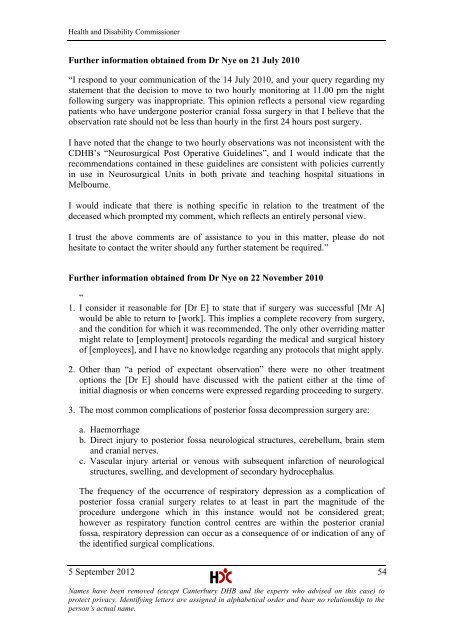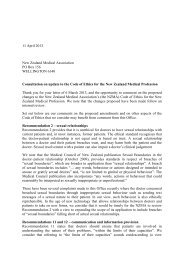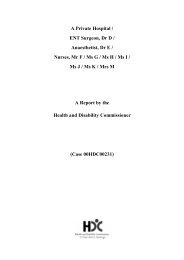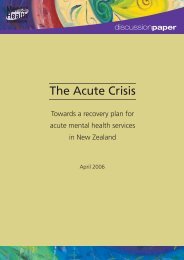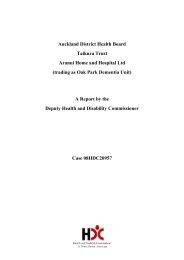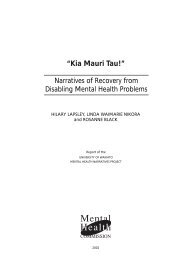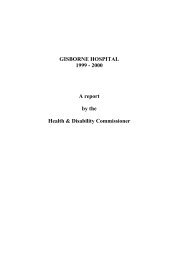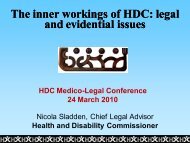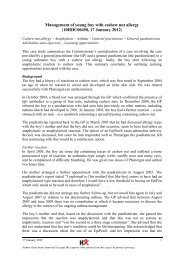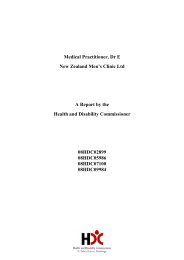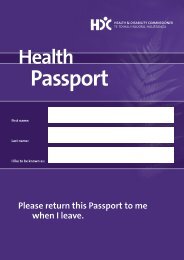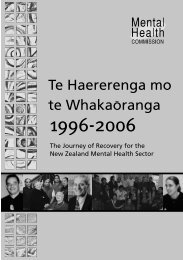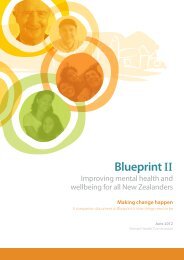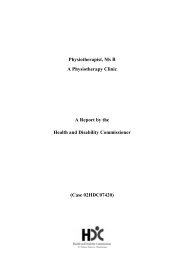09HDC01565 - Health and Disability Commissioner
09HDC01565 - Health and Disability Commissioner
09HDC01565 - Health and Disability Commissioner
Create successful ePaper yourself
Turn your PDF publications into a flip-book with our unique Google optimized e-Paper software.
<strong>Health</strong> <strong>and</strong> <strong>Disability</strong> <strong>Commissioner</strong><br />
Further information obtained from Dr Nye on 21 July 2010<br />
―I respond to your communication of the 14 July 2010, <strong>and</strong> your query regarding my<br />
statement that the decision to move to two hourly monitoring at 11.00 pm the night<br />
following surgery was inappropriate. This opinion reflects a personal view regarding<br />
patients who have undergone posterior cranial fossa surgery in that I believe that the<br />
observation rate should not be less than hourly in the first 24 hours post surgery.<br />
I have noted that the change to two hourly observations was not inconsistent with the<br />
CDHB‘s ―Neurosurgical Post Operative Guidelines‖, <strong>and</strong> I would indicate that the<br />
recommendations contained in these guidelines are consistent with policies currently<br />
in use in Neurosurgical Units in both private <strong>and</strong> teaching hospital situations in<br />
Melbourne.<br />
I would indicate that there is nothing specific in relation to the treatment of the<br />
deceased which prompted my comment, which reflects an entirely personal view.<br />
I trust the above comments are of assistance to you in this matter, please do not<br />
hesitate to contact the writer should any further statement be required.‖<br />
Further information obtained from Dr Nye on 22 November 2010<br />
―<br />
1. I consider it reasonable for [Dr E] to state that if surgery was successful [Mr A]<br />
would be able to return to [work]. This implies a complete recovery from surgery,<br />
<strong>and</strong> the condition for which it was recommended. The only other overriding matter<br />
might relate to [employment] protocols regarding the medical <strong>and</strong> surgical history<br />
of [employees], <strong>and</strong> I have no knowledge regarding any protocols that might apply.<br />
2. Other than ―a period of expectant observation‖ there were no other treatment<br />
options the [Dr E] should have discussed with the patient either at the time of<br />
initial diagnosis or when concerns were expressed regarding proceeding to surgery.<br />
3. The most common complications of posterior fossa decompression surgery are:<br />
a. Haemorrhage<br />
b. Direct injury to posterior fossa neurological structures, cerebellum, brain stem<br />
<strong>and</strong> cranial nerves.<br />
c. Vascular injury arterial or venous with subsequent infarction of neurological<br />
structures, swelling, <strong>and</strong> development of secondary hydrocephalus.<br />
The frequency of the occurrence of respiratory depression as a complication of<br />
posterior fossa cranial surgery relates to at least in part the magnitude of the<br />
procedure undergone which in this instance would not be considered great;<br />
however as respiratory function control centres are within the posterior cranial<br />
fossa, respiratory depression can occur as a consequence of or indication of any of<br />
the identified surgical complications.<br />
5 September 2012 54<br />
Names have been removed (except Canterbury DHB <strong>and</strong> the experts who advised on this case) to<br />
protect privacy. Identifying letters are assigned in alphabetical order <strong>and</strong> bear no relationship to the<br />
person’s actual name.


